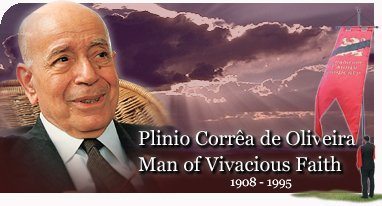
I am a convinced Thomist. The aspect of philosophy that most attracts me is the philosophy of history. In view of this I find the connection between the two kinds of activity to which I have dedicated my life: study and action.
I have exercised the latter in a very defined field, the diffusion of doctrine, carried out sometimes in the manner of dialogue, other times — and I say this readily, anachronistic as the thing and the word may seem — with polemics.
The book Revolution and Counter-Revolution, in which I condense the essential elements of my thought, explains my ideological orientation.
Religion and Philosophy Move History
One of this book’s presuppositions is that the course of history, contrary to the claims of so many philosophers and sociologists, is not traced exclusively or preponderantly by the dictates of matter over men. Without a doubt, these have their influence in human action, but the direction of history belongs to men, endowed as they are with free and rational souls. In other words, it is they who direct the course of events, acting more or less profoundly over the circumstances in which they find themselves and receiving in variable measure the influences of these same circumstances.
Now, human action normally takes place in accordance with man’s view of the universe, of himself, and of life. That amounts to saying that religious and philosophical doctrines dominate history, that the most dynamic nucleus of the factors that transform history is found in the successive attitudes of the human spirit in face of religion and philosophy.
Christian Civilization – Entire Consonance with Natural and Divine Law
From this I pass to another presupposition of Revolution and Counter-Revolution. A Catholic view of history must above all take into account that both the Old Law and the New, of themselves, contain not only the precepts by which man should model his soul in order to become like unto God, thus preparing himself for the Beatific Vision, but also the fundamental norms of human conduct in conformity with the natural order of things.
Thus, while man advances in the life of grace by the practice of virtue, at the same time he elaborates a culture — a political, social, and economic order — in entire consonance with the basic and perennial principles of Natural Law. This is what is called Christian civilization.
Obviously, the good arrangement of earthly things is not exclusively composed of these basic and perennial principles. It also comprises much that is contingent, transitory, and free. Christian civilization embraces an incalculable variety of aspects and nuances. This is so true that, from a certain point of view, one can speak not just of Christian civilization but of Christian civilizations. Nevertheless, given the identity of the fundamental principles inherent to all Christian civilizations, the great reality hovering above them all is a powerful unity, which merits the name Christian civilization through antonomasia. Unity in variety and variety in unity are elements of perfection. Christian civilization remains one in all the variety of its realizations, so it can be said that, in the most profound sense, there is just one Christian civilization. But it varies so prodigiously in its unity that a legitimate freedom of expression permits the affirmation that there exist various Christian civilizations.
Eternal and Natural Law: The Foundation of Morals and Law
Given this clarification — analogously applicable to the concept of Catholic culture — I will employ the expressions Christian civilization and Christian culture in their “major” sense, that of unity.
I dispense myself from referring those assertions to texts of Saint Thomas or the Magisterium of the Church, these being so numerous and so well known by those who seriously study the subjects that the work would become, at one and the same time, tedious and superfluous. This observation likewise applies to other considerations that will follow.
On the basis of these presuppositions it is easy to define the role of the Church and Christian civilization in history.
Nations Attain Perfect Civilization Only By Corresponding to Grace and to the Faith
While man can with firm certainty and without contamination of error know that which in divine things is not per se inaccessible to human reason, it is impossible for him, because of Original Sin, to durably follow the Law of God. This is possible only by means of grace. Even so, in order to safeguard man against his own malice and weakness, Jesus Christ endowed the Church with an infallible Magisterium that unerringly teaches man not only the religious but also the moral truths necessary for salvation. Man’s adhesion to the Magisterium of the Church is a fruit of Faith. Without Faith man can neither enduringly nor entirely know or keep the Commandments. Thus, nations can attain perfect civilization, which is Christian civilization, only by corresponding to grace and Faith, which includes a firm recognition of the Catholic Church as the one true Church and of the Ecclesiastical Magisterium as infallible.
History’s most profound and central point thus consists in knowing, professing, and practicing the Catholic Faith.
Evidently, in saying this I do not deny that there have been elevated aspects in non-Christian civilizations. However, all of these civilizations were disfigured by one or another trait shockingly divergent from the very elevation they displayed in other aspects. It is enough to remember the great extent of slavery and the vile condition imposed upon women before the advent of Our Lord Jesus Christ. Never has a civilization displayed the eminent perfection inherent to Christian civilization.
Likewise, I do not contest that civilization may contain important traces of Christian tradition in countries where the population is preponderantly schismatic or heretical. Only with the Catholic Church, however, can Christian civilization blossom in its plenitude, and only in Catholic peoples can it be perfectly maintained.
“There Was a Time When the Philosophy of the Gospels Governed the States…”
Someone might ask when, historically, did this perfect Christian civilization exist? Is this perfection attainable in this life?
My response will shock and irritate many readers. Nevertheless, I affirm that there was a time in which a large part of humanity knew the ideal of perfection and fervently and sincerely tended toward it. In consequence of that tendency of the souls, the fundamental traits of civilization became as Christian as the circumstances of a world slowly raising itself out of barbarism permitted. I refer to the Middle Ages, of which, despite this or that defect, Leo XIII eloquently wrote:
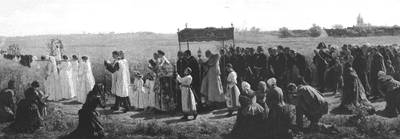
had permeated the laws, institutions, and customs of the people.”
There was once a time when the philosophy of the Gospels governed the states. Then it was that the power and divine virtue of Christian wisdom had permeated the laws, institutions, and customs of the people; imbuing all ranks and relations of civil society. Then, too, the religion instituted by Jesus Christ, firmly established in befitting dignity, flourished everywhere thanks to the favor of princes and the legitimate protection of magistrates. Then the Priesthood and the Empire were happily united in concord and friendly interchange of good offices. So organized, civil society bore fruits beyond all expectation, whose remembrance is still, and always will be, in renown, registered as it is in innumerable documents that no artifice of the adversaries can destroy or obscure. (Encyclical Immortale Dei, November 1, 1885).
A Monument Raised from a Ruin, an Institution from a Custom
This manner of seeing the fullness of the Church’s influence in the Middle Ages is also found in the following text of Paul VI, referring to the role of the Papacy in Medieval Italy:
Let us not forget the centuries during which the Papacy lived in [Italy’s] history, defended its frontiers, guarded its cultural and spiritual patrimony, educated its offspring for civilization, elegance of manners, and moral and social virtue, and united its Roman conscience and best sons to the very universal mission [of the Papacy]…” (Allocution to the President of the Italian Republic, January 11, 1964).
Thus, Christian civilization is not utopian. It is something possible and, in a determined epoch, effectively achieved. Finally, it is something that in a certain manner endured even after the Middle Ages, to such a point that Pope St. Pius X could write:
Civilization has not yet to be founded, nor has the new State to be built in the clouds. It existed and exists; it is Christian civilization; it is the Catholic City. The only question is that of reestablishing it and restoring it without delay on its natural and divine foundations against the continually repeated attacks of the wicked utopia of revolution and impiety (Apostolic letter Notre Charge Apostolique, August 25, 1910).
Therefore, Christian civilization has ample, living vestiges even in our days.
Crises Arise from Disordered Passions Inflamed by the Powers of Darkness
Some may imagine that all the crises of culture and civilization are necessarily born of some thinker, from whose vigorous mind issues the clarifying — or destructive — spark that, first spreads in the ambiences of high culture and afterwards reaches the entire social body. Clearly, some crises are born in this way, but history does not attest that all were thus born. In particular, the crisis that precipitated the decline of the Middle Ages and gave rise to Humanism, the Renaissance, and the Protestant pseudo-reformation did not originate this way.
The influence of the Church over every soul, every people, every culture, and every civilization is continually threatened by the very fact that she asks of men an austerity of customs that decadent human nature finds arduous. The disorderly passions, inflamed by the preternatural action of the Powers of Darkness, continually incite men and nations toward evil. These tendencies exploit the debility of the human intelligence. Man easily invents sophisms to justify the evil actions he wants to practice or is already practicing, or the evil customs he already has or is acquiring. As Paul Bourget wrote, “It is necessary to live as one thinks, under the pain of, sooner or later, thinking as one has lived” (Le Démon du Midi).
The Weight of Pride and Sensuality in the Revolt Against the Church
Two passions in particular, pride and sensuality, foment revolt against Christian Morals and Faith.
Pride leads man to reject any superiority in another and generates in him an appetite for preeminence and command that easily leads to a paroxysm. This paroxysm is the end towards which all disorders tend. At its apex, pride takes on various metaphysical hues: No longer content with shaking off this or that specific superiority or hierarchical structure, the proud person desires the abolition of any and every superiority in whatever field it may exist. Therefore, he imagines that only omnifarious and complete equality are endurable and, for that very reason, the supreme maxim of justice. Pride thus ends up engendering its own morality, at the heart of which is a metaphysical principle: The order of being requires equality, and all inequality is ontologically bad. For what I would call “integral pride,” absolute equality is the supreme value to which everything must conform.
Sensuality is another disordered passion of decisive importance in the process of revolt against the Church. Of itself, it leads to shamelessness, inviting man to trample every law underfoot and to reject every restraint as unendurable. Its effects are added to those of pride in order to occasion in the human mind all kinds of sophisms capable of undermining the very heart of the principle of authority.
The tendency that pride and sensuality awaken aims at abolishing all inequality, authority, and hierarchy.
Faith Leads to Love of Hierarchy; Corruption, to Anarchical Egalitarianism
Clearly, these disordered passions, even when one gives in to them, can encounter in a soul — or in the spirit of a people — counterbalances posed by convictions, traditions, and the like. In that case, the soul — or the mentality of the people — becomes divided between two opposing poles: on one side, the Faith, inviting it to austerity, to humility, and to the love of all legitimate hierarchies; and on the other side, corruption, inviting it to complete egalitarianism, “anarchical” in the etymological sense of the word. As we will see a bit further on, corruption eventually leads to religious doubt and complete denial of the Faith.
The option for one or the other of these poles is not usually made from one moment to the next, but rather little by little. By means of successive acts of love for truth and good, a person or a nation can progress gradually in virtue and even be completely converted. This is what took place with the Roman Empire under the influence of the Christian communities, the prayers of the faithful in the catacombs and deserts, the heroism they displayed in the arena, and the examples of virtue they gave in everyday life. It is a process of ascension.
The process can also be one of decadence. With the impact of the disordered passions, good convictions are shaken, good traditions lose their lifeblood, good customs are replaced by risqué customs that degenerate to the point of being frankly censurable and eventually scandalous.
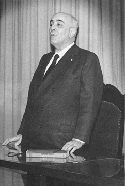
Principal Doctrinal Elements of Revolution and Counter-Revolution
All this being said, I recapitulate here the principle doctrinal elements on which I based Revolution and Counter-Revolution:
a) the mission of the Church as the only master, guide, and fount of life of the peoples advancing toward the perfect civilization;
b) the continuous opposition of the disordered passions, especially pride and sensuality, to the influence of the Church;
c) the existence of two opposing poles in the human spirit, towards one of which it necessarily heads: on one side, the Catholic Faith, which instills love for order, austerity, and hierarchy; on the other, the disordered passions, which provoke immodesty and revolts against law, hierarchy, and any form of inequality, and which finally lead to doubt and entire denial of the Faith;
d) the notion of a process — the expression understood without prejudice to the free will — by which individuals or peoples, feeling the attraction of the two opposing poles, gradually draw nearer one and away from the other.
e) the influence of this moral process over the development of doctrines. Bad tendencies incline toward error, good tendencies toward truth. The great modifications of the spirit of peoples are not the mere result of doctrines elaborated by small retreats of intellectuals serenely elucubrating at the margins of society. For a doctrine to find resonance in a people it is usually necessary that that people have an affinity for the doctrine. And it is not rare that the very lucubrations made by the learned in their studies is influenced more than one thinks by these appetites for the ambience in which they themselves live.
Some Fundamental Definitions
Having all this in sight, it is easy to define the fundamental concepts of Order, Revolution, and Counter-Revolution:
1) Order: not only the methodical and practical disposition of material things but, corresponding to the Thomist concept, the upright disposition of things according to their proximate and remote physical, metaphysical, natural, and supernatural end;
2) Revolution: not essentially a riot in the streets, a volley of gunfire, or a civil war, but every effort that aims to dispose beings against Order;
3) Counter-Revolution: every effort that aims to circumscribe and eliminate the Revolution.
Revolutions A and B
As one can see, Order, just as the Revolution and the Counter-Revolution, can exist in a) tendencies; b) ideas; c) laws, structures, institutions, and customs.
Thus, we call the Revolution “tendential” while it exists in the tendencies, and “sophistic” when it develops itself in the terrain of doctrines, under the influence of the tendencies.
These two modalities of the Revolution constitute an eminently spiritual phenomenon; that is, they have the human soul and the mentality of societies as their field of operation. They form a whole that we call “Revolution A.”
When the Revolution passes from the interior of souls to acts, producing historical convulsions, disordering laws, structures, institutions, and so forth, it constitutes what we call “Revolution B.”
Evidently, these notions, here presented with utmost brevity, demand a series of qualification and adaptations that I expound in Revolution and Counter-Revolution and that are impossible to explain here.
I limit myself to clarifying that in delineating what is most essential in history in these matters, I do not claim that history is reduced to this. The most elementary observation indicates that innumerable factors, including ethnic, geographic, and economic ones, powerfully condition the course of history.
The Egalitarian Will Have Ardent Objections Against the Faith
There remains a word to be said about the nexus between absolute and metaphysical egalitarianism and the Faith. One who is radically egalitarian will necessarily have innumerable objections against Catholic doctrine. He will object to the concepts of a personal, perfect, and eternal God, hovering infinitely above His imperfect and contingent creatures; of the Law promulgated by God, which it is necessary to obey; of Revelation, which imparts truths beyond the human mind’s natural capacity of knowing; of the infallible Magisterium of the Church; of the monarchical and aristocratic structure of the Church. Everything, after all, even the notion of a judgment that will reward the good and chastise the evil, irritates the egalitarian and tempts him to defiance.
On the other hand, the Catholic learns from Saint Thomas (Summa Theoligica, I, q. 47, a.2) that inequality is a prerequisite for the perfection of created order. And in consequence, the inequalities of power, science, social class, and fortune are intrinsically legitimate and indispensable to good order, so long as they are not accentuated to the point of denying the dignity and the sufficiency and stability of life that is each one’s right by virtue of his being a man, by his work, and so forth.
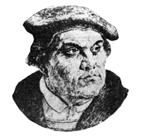
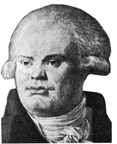
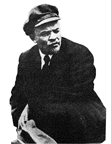
Luther, Danton, Lenin, key figures in the Three Revolutions.
The First Revolution: Humanism, Renaissance, Protestantism
This said, we encounter the profound sense of the sophistic Revolution developed in plan “A” and that of Revolution B, which took place in fifteenth-century Europe in consequence of the preceding tendential Revolution A.
The decline of the Middle Ages was marked by an explosion of pride and sensuality. That explosion generated egalitarian and liberal tendencies that did nothing but progress in the subsequent centuries.
Because of this, in Humanism and the Renaissance we find hostility towards the supernatural, the Magisterium of the Church, and customs. In Protestantism we find free examination; minimalism in the face of the supernatural; the acceptance of divorce; the abolition of the religious state and the submission expressed in the vows of poverty, chastity, and obedience; and the virtual elimination of ecclesiastical hierarchy. Of course, an ecclesiastical status exists in almost all the Protestant sects, but the clear and profound difference between the clergy and the laity that exists in the Catholic Church was debilitated within them in accordance with their understanding of the priesthood. Furthermore, the hierarchical structure of the ecclesiastical state as it exists in the Church was also profoundly mutilated in the Protestant sects by their denial of the monarchical element, the Papacy. If among Anglicans the egalitarian tendency did not abolish the episcopal dignity, already among the Presbyterians there are no dignitaries entitled “bishops,” but only “presbyters.” In other sects the flurry of egalitarianism came to the point of abolishing even the class of “priest.”
The Church Cannot Change Her Hierarchical Structure Instituted by Christ
In emphasizing the liberal and egalitarian factor in Humanism, the Renaissance, and Protestantism, I clearly do not claim to deny that other causes may have contributed to the generation and expansion of these movements. I say only that in origin, psychology, doctrines, and in what we would call today the successful propagation and realization of these movements, tendential Revolution A, in a radically anarchical and egalitarian sense, played the role of the main force.
I also do not mean to affirm that this main force acted only in those countries that separated themselves from the Church. The Renaissance and Humanism blew with all intensity even in the Catholic world. And even though tendential Revolution A did not manage to cause their formal rupture with the Church, it still awakened within them larval forms of Protestantism, principally Jansenism. This produced a progressive religious cooling, which culminated in skepticism. An attentive study of royal absolutism, which in no Protestant country was more radical than in Catholic France, shows that the politics of the absolutist monarchs, in everything that did not pertain to their own authority, was marked by a certain egalitarian spirit. The progressive reduction of the privileges of the clergy and the nobility by the absolutist monarchs moved toward a political leveling of all citizens under the power of the State. The continual favor of the kings for the most active and developed part of the plebeian class, the bourgeoisie, contributed even more towards political equality.
The Second Revolution: Encyclopedism, Absolutism, the French Revolution
The corruption of customs, growing since the end of the Middle Ages, attained in the eighteenth century a degree that frightened even some of the leaders of this school of thought.
French society, swollen with the factors that had produced Protestantism in the Nordic countries, prepared itself through Encyclopedism and Absolutism for a profound convulsion that would be nothing other than the projection into the religious, philosophical, political, social, and economic sphere of the essence of Protestantism.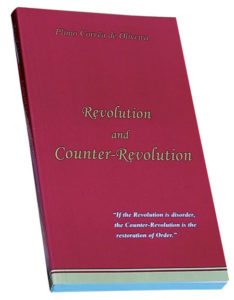
FREE READ: Revolution and Counter-Revolution
Thus, at the end of the eighteenth century, Protestantism, already aged and tired, showed itself lacking force of expansion, undermined from within by growing doubt and skepticism, yet maintaining a vestige of life thanks principally to the State, while in France the liberal and egalitarian tendencies attained an apex. Humanism and the Renaissance had been dead for some time, and everything was exhausted in Protestantism. But that which was most dynamic and fundamental in these three movements — the spirit that occasioned them — survived them and was stronger than ever. This spirit would necessarily precipitate France, and afterwards Europe in its entirety, into a liberal and egalitarian cataclysm. The French Revolution was marked in such a way by the spirit of Protestantism that the constitutional church it organized was nothing save a poorly veiled instrument for the implantation of actual Protestantism in France. The egalitarian, anti-monarchical, and anti-aristocratic orientation of the French Revolution is the projection in the civic sphere of the egalitarian tendency that led Protestantism to reject the aristocratic and monarchical elements of the ecclesiastical hierarchy. The communist ferment that worked the extreme left of the Revolution and eventually made itself explicit in such movements as that of Babeuf, was nothing save the secular analogy of the communist movements, like the Moravian Brotherhood, that produced what could be called the Protestant extreme left. The effects of Humanism, the Renaissance, and Encyclopedism in the French Revolution were evident in the complete secularization of the State, the Greco-Roman masquerade, and the continual evocation of the republics of classical paganism.
It behooves me to insist that Protestantism, Humanism, and the Renaissance were nothing save aspects that the spirit of anarchy and egalitarianism assumed in its long historical trajectory.
These aspects died in part because the spirit that occasioned them, destructive par excellence, had destroyed them in their very center. The French Revolution was nothing more than a new and even more energetic aspect of this same spirit.
The French Revolution Spread Through Europe in the Rucksacks of Napoleon’s Troops
Through well-known historical vicissitudes, the French Revolution, although apparently ending with the establishment of the Empire, spread throughout all of Europe, carried in the rucksacks of Napoleon’s troops. The wars and revolutions marking the period from 1814 to 1918 — that is, from the fall of Napoleon to the fall of the Habsburgs, Romanovs, and Hohenzollerns — were an ensemble of convulsions that transformed all Europe according to the spirit of the French Revolution. The Second World War did nothing save accentuate this transformation. Only a half-dozen of the ancient European monarchies remain today — all of them too timid to assert themselves and so docile in permitting themselves to be increasingly formed by the republican spirit as to give the impression that at any moment they are going to ask pardon for still existing.
In making these observations by no means do I affirm that there were no royal abuses needing correction in the structures destroyed. Nor do I wish to say that adoption of an elective and popular form of government can result only from the egalitarian and liberal spirit we have been analyzing. This would be neither doctrinally true nor historically justified. The Middle Ages had various aristocratic political structures, if not monarchical, such as the Republic of Venice, and various structures with neither monarchical nor aristocratic character, such as diverse Swiss cantons and the German free cities. All these forms of government lived pacifically among themselves, for they understood the legitimate diversity in forms of government according to time, place, and other circumstances.
The Equality Myth, a Founding Legend
The Revolution that exploded at the end of the Middle Ages was moved by a spirit differing completely from that which had led to the formation of the aristocratic or bourgeois states of Medieval Europe. This spirit amounted to the affirmation of complete equality and absolute and anarchic liberty as the sole maxims of order and justice, valid for all times and places.
In its turn, this spirit undermined the politically egalitarian bourgeois society it had spawned, and at last, under the most audacious of its affirmations, eventually flared up in the third great revolution of the West, the communist revolution.
The Principles of 1789 — Towards Complete Liberty and Equality
In the Declaration of the Rights of Man — the Magna Carta of both the French Revolution and the historical era it inaugurated — the egalitarian thesis expressed itself in all its nakedness: “Men are born and remain free and equal in their rights.”
Clearly, this principle is susceptible of good interpretation. Men, by nature, are fundamentally equal. It is only in accidents that men are unequal. At the same time, being endowed with a spiritual soul, and therefore with intelligence and will, they are fundamentally free. This liberty is limited only by Natural and Divine Law and by the power of the diverse spiritual and temporal authorities to which men must submit.
No one can deny that in every epoch there have been rulers who violated this fundamental equality and liberty. In response, throughout history there have been various defensive movements against excessive authority, seeking to confine it within its just limits. Such movements, limited to this objective, unquestionably merit applause. Properly understood, equality and liberty are as worthwhile recalling in the eighteenth century as in any other epoch.
It is quite certain that among the first revolutionaries in 1789 there were persons who desired nothing save a just restraint of the public power and who understood the liberty and equality promulgated in the Declaration of the Rights of Man in their most favorable sense.
But the text of the famous Declaration was excessively general, affirming equality and liberty without noting any restriction. This favored a broad and adverse interpretation: absolute and universal equality and liberty.
 Learn All About the Prophecies of Our Lady of Good Success About Our Times
Learn All About the Prophecies of Our Lady of Good Success About Our Times
Well understood, this interpretation corresponded to the spirit of the nascent Revolution. Throughout its course it rid itself of any partisan not in communion with this spirit. The persecution of the nobles and the clergy was followed by that of the bourgeois. Only the manual laborers were to remain.
With the end of the Terror, the bourgeoisie, wishing to eliminate the former privileged classes throughout Europe, continued to affirm the “immortal principles” of 1789. They did so in an ambiguous and imprudent manner, having no doubt about arousing the tendency towards complete equality and liberty among the masses and obtaining their support in the fight against royalty, aristocracy, and clergy.
This imprudence greatly facilitated the explosion of the movement that would necessarily place the power of the bourgeoisie in check, for if all men are free and equal, by what right do the rich exist? By what right do children inherit, without working, the goods of their parents?
Utopian Communism Proclaims Bourgeoisie Politics a Farce Without Economic Equality
Even before industrialization had formed great concentrations of malnourished proletarians, utopian communism had already proclaimed the political equality instituted by the bourgeoisie a sham and demanded absolute social and economic equality. Anarchism, dreaming of a society without authority, spread. These radical principles, which had a restricted number of militants in the phase of utopian communism, still attained a prodigious diffusion in the West. Little by little they undermined the mentality of numerous monarchs, as well as civil and ecclesiastical rulers and persons of note, instilling in a great number of the beneficiaries of the existing order a certain sympathy for the “generosity” of libertarian and egalitarian ideas and a “guilty conscience” about the legitimacy of their own vested powers.
As I see it, Karl Marx’s great accomplishment was not the elaboration of so-called scientific communism, a confused and indigestible doctrine known to few. Marxism is as unknown by the communist bases and public opinion of our days as the thoughts of Plotinus and Averroës. What Marx did manage, however, was to unleash the worldwide communist offensive by uniting the adepts of a radically egalitarian and anarchic tendency, entirely inspired by utopian communism.
In other words, if the Marxist leaders themselves, in greater or lesser measure, are imbued with Marx, the privates under their command are generally incapable of knowing the doctrine. What moves them and unites them around their leaders are vague ideas of equality and justice, inspired by utopian communism. And if the Marxist gangs encounter an aura of sympathy in certain zones of public opinion, they owe it to the almost universal radiation of the egalitarian principles of the French Revolution and the romantic sentimentalism inherent to utopian socialism.
Egalitarian and Anarchical Substratum Remains Influential
The principal cause of the chaos in which the West founders and towards which it leads the rest of the world stands out among these considerations. This cause is the very generalized acceptance of the tendencies and doctrines of an egalitarian and anarchic substratum which, entirely out of fashion in properly intellectual circles, still profoundly influences public opinion. And it also continues to serve the communists as bait for luring, in certain past and present political circumstances, the multitudes with which they intend to raze the last vestiges of sacrality and hierarchy.
All this is not to affirm that the thought of Proudhon and his congeners still constitutes the great ideological lever of contemporary events. The utopians are dead, and in our days almost no one thinks of them. They were nothing more than a step in the great trajectory that originated in the ideological and cultural movements of the sixteenth century. They contributed in giving universal scope to the aspirations of the socio-economic leveling that the French Revolution contained only in germ. These aspirations of total economic and social leveling, for which the utopians were only loudspeakers, echoed everywhere. Long after they and their works have fallen into oblivion, this echo reverberates in history.
Therefore, if we want to check the process that is leading to the new, looming catastrophe, we must principally refute the tragic doctrinal error that identifies absolute equality with absolute justice, and true liberty — to which Truth and Good are entitled — with the free course and even the favoring of every error and irregularity. This leads us to consider the Counter-Revolution.

The Counter-Revolution Must Point out the Revolution’s Fundamental Errors
Throughout the last centuries, many movements have raised themselves up against the revolutionary process, but their concrete success was transitory and at times null. Not that these movements lacked the support of brilliant talents, of well-placed people, or even of large sectors of the public. Though they occasionally called attention to the most profound and metaphysically important errors, more often than not, these movements limited themselves to fighting the Revolution in one or another of its religious, political, social, or economic manifestations. As a result, the Revolution continued safe and sound on its course.
In order to deter it, others judged it more fitting to use their language and expertise to fight against some of the very abuses the Revolution itself denounced. Now, to combat abuses is always meritorious, but how naive to imagine that the strength of the Revolution is primarily in the indignation aroused by certain abuses it cried out against! History proves the fallacy of this tactic. Some abuses that existed even centuries ago in Europe were rectified in such a way that Pius XII could say to the Katho-likentag of Vienna: “In our days there appears before the gaze of the Church the first epoch of contemporary social struggles. The heart of this epoch is dominated by the question of the worker: the misery of the proletariat and the duty of raising this class of men, left defenseless amid the uncertainties of economic circumstances, up to the dignity of the other classes of the city, which are gifted with necessary rights.
Nowadays, this problem can be considered as having been resolved, at least in its essential parts, and the Catholic world contributed towards this solution in a loyal and efficacious manner” (Pius XII, Radiomessage to the Catholics’ Day of Vienna, September 14, 1952). Meanwhile, the Revolution continues to roar, more menacing than ever.
Three Reasons the Church’s Enemies Hate the Immaculate Conception
Thus, without denying the meritorious character of so many past and present movements of counter-revolutionary orientation and without denying what is meritorious in the struggle against the injustices caused by the present order of things, it seems to me that the great necessity of the moment is to point out the fundamental metaphysical errors of the Revolution and the intimate cohesion of the three billowing waves that threw themselves successively against Western Christianity: in a first step, Humanism, the Renaissance, and the Protestant pseudo-reformation; later, the French Revolution; and finally, Communism.
In the Realm of Ideas – Not Only the Old and the New, But Above All the True and the Perennial
Many, on reading this “self-portrait,” will have had an objection: All this is anachronistic and incapable of taking root in the world we live in.
The facts say otherwise. In the field of ideas there exists not only the old and the new, as evolutionists would have it, but above all there are the true, the good, the beautiful, and the perennial, in irreconcilable opposition to error, evil, and ugliness. And not only have significant sectors of modern youth remained sensitive to the verum, bonum, and pulchrum, but they have also engaged in a resolute march of expansion.
The tradition of the perennial is not death, but life — life today and tomorrow. In no other way can the patent fact of the repercussion of the various TFP’s among the freshest youth of our most-new continent be explained.
I intend to be not merely a defender of the past, but a participant — with others — in influencing the present and preparing for the future.
I am certain that the principles to which I have dedicated my life are as up-to-date today as ever and that they indicate the path the world will follow in the coming centuries.
The skeptics will smile, but the smiles of skeptics were never able to hinder the victorious march of those with Faith.

